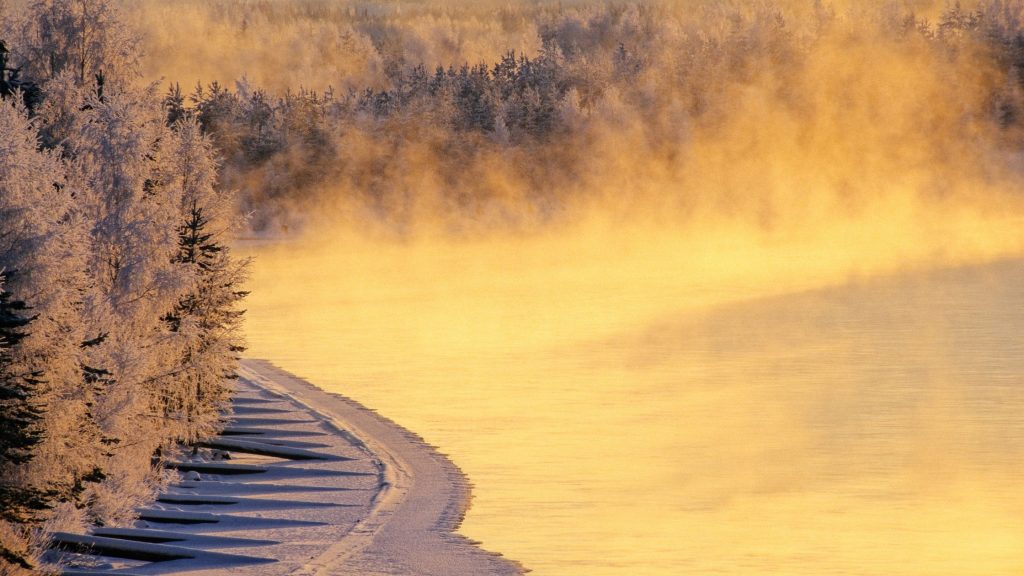There’s a nature park near my home with long, winding paths and beautiful bridges over the creek. In spring, it’s a theatre of renewal as the trees bud, the birds celebrate, and the creek thaws into a trickle. In summer, it’s a vibrant place, full of people and wildlife and the sounds of delight. In autumn, it becomes a masterpiece of colour so resplendent it stops me in my tracks.
But it’s the winter season in the park that I’ve come to appreciate most.
The crispy crunch of the snow beneath my feet is one of my favorite sounds. My childhood on the Canadian prairies filled my memory bank with happy moments in the white stuff—climbing a hill so I could careen back down on a toboggan, walking through a wintery wonderland to get to my uncle’s skating rink, and flopping onto a fresh ivory blanket to make snow angels and snow forts.
So there’s an element of nostalgia for me on my winter walks through the woods. But that’s not what draws me there.
It’s the silence.
On a day without wind, I walk to a certain spot and stop walking. The crunching ceases and all I hear is stillness. The quiet is almost surreal.
It’s peaceful.
So I just stand there. I soak in the silence and wait for my mind to follow my body in stillness.
The Spotlight of Silence
“We live in a time of an unprecedented amount of noise,” writes Jordan Raynor in his book Redeeming Your Time. “And I’m not referring to just the obvious increase in external noise created by nonstop news and entertainment and the buzzing of the devices in our pockets and purses; I’m primarily referring to what all that external noise creates—namely, internal noise… allow me to offer my own definition of noise… external information and entertainment that block our ability to be silent and reflective.” [1]
Silence makes us uncomfortable. Dietrich Bonhoeffer had this insight:
“We flee silence. We race from activity to activity to avoid having to be alone with ourselves for even a moment…”[2]
Without distraction, we’re forced to face the reality of our circumstances and how we feel and who we are. We’re burdened with our reflections in the mirror. It’s an abrupt intrusion of a spotlight that reveals our inadequacies, our unfulfilled longings, and our sin.
Silence exposes the darkness.
Hearing God in the Silence
Bonhoeffer suggested that silence exposes a deep fear:
“Not only are we afraid of ourselves, of discovering and unmasking ourselves, but even more we are afraid of God, that he might disturb our aloneness and discover and unmask us, that God might draw us into partnership and do with us whatever he wants. Because we fear such unnerving, lonely encounters with God, we avoid them, avoid even the thought of God lest he suddenly get too close to us. Suddenly having to look into God’s eyes, having to be accountable before him, is too dreadful a notion; our perpetual smile might fade, things might get completely serious in a way to which we are not at all accustomed.”[3]
Our resistance to silence reeks of cowardly avoidance.
“The problem is less about what noise we allow into our minds and more about what noise we’re keeping out—namely, our own thoughts and the ability to listen to God’s voice,”[4] says Raynor. He proposed that “By filling our lives with noise, we are becoming the ‘wicked man’ of Psalm 10:4, who ‘in all his thoughts’ has ‘no room for God.’”[5]
Because of our opposition to silence, we miss out on its splendor.
The Truth About Silence
The Bible embraces silence as a faith-filled response to God’s sovereignty and trustworthiness. God’s Word deems silence a means to strength and peace. And don’t we all want more strength and peace?
“in quietness and in trust shall be your strength (Isaiah 30:15, ESV).”
“For God alone my soul waits in silence; from him comes my salvation. He alone is my rock and my salvation, my fortress; I shall not be greatly shaken… For God alone, O my soul, wait in silence, for my hope is from him (Psalm 62:1-2, 5 ESV).”
“It is good that one should wait quietly for the salvation of the Lord (Lamentations 3:26, ESV).”
Consider the life of Jesus. After forty days in the wilderness—surely a time of much silence and solitude—Jesus returned “in the power of the Spirit (Luke 4:14, NIV)”, strengthened and ready to do what God had called Him to do.
And did you know that Jesus deliberately made time for silence and solitude, especially when He got busier? We see this in the book of Luke.
“…the news about him spread all the more… But Jesus often withdrew to lonely places and prayed (Luke 5:15-16, NIV).”
Rest & Recognizing Our Humanity
Silence is a type of rest, and our bodies and minds were designed to need rest. God commanded us to rest (Exodus 20:8-11).
We are not God. We are human, with serious limitations—both physically and mentally. Yet, in the digital age in which we live, we’re trained to believe our minds have limitless capacity.
The consequences for exceeding our capacity are life-altering. Constant input (or noise, as Raynor calls it) changes us—our ability to focus, to think deeply, to problem solve. It takes an emotional toll and can even affect us physically. (Surely I’m not the only one who has trouble sleeping when my mental capacity is maxed out!)
We need silence because we need rest, and that requires discipline. It’s a choice. Allowing the light of silence to expose whatever is in the darkness and noise of our minds demands intentionality.
The Discipline of Silence
Glenna Marshall wrote about the fight for silence in her latest post, “Prayer and Mental Margin”.
“While shivering through my normal morning route, I automatically opened the Voxer app on my phone and caught up on messages, followed by Marco Polo, and then some music before switching to a podcast. All good things, but goodness, that’s a lot of input for a forty-minute walk.”[6]
So relatable, right? We habitually fill the silence in countless miniscule moments that become a cacophony of distraction.
- The radio in the car
- Smartphone scrolling while waiting for anything
- Music, movies, TV, podcasts, and audiobooks as “background noise”
Our struggle with mental clutter is likely because of our failure to “just think”. We need mental space to sort our thoughts, to remember, to pray.
So we need silence. It’s a gift from God and a spiritual discipline. When we learn to invite silence, we discover untold treasures of God’s grace, good, and glory.
“Be still, and know that He is God (Psalm 46:10, emphasis mine).”
How will you embrace the silence today?
[1] Raynor, J. (2021). The Kingdom of Noise. In Redeeming your time: 7 biblical principles for being purposeful, present, and wildly productive (pp. 53), WaterBrook.
[2] Reinke, T. (2018, January 20). Why We Should Escape Social Media. Desiring God. Retrieved January 27, 2022, from https://www.desiringgod.org/articles/why-we-should-escape-social-media.
[3] Reinke, T. (2018, January 20). Why We Should Escape Social Media. Desiring God. Retrieved January 27, 2022, from https://www.desiringgod.org/articles/why-we-should-escape-social-media.
[4] Raynor, J. (2021). The Kingdom of Noise. In Redeeming your time: 7 biblical principles for being purposeful, present, and wildly productive (pp. 63), WaterBrook.
[5] Raynor, J. (2021). The Kingdom of Noise. In Redeeming your time: 7 biblical principles for being purposeful, present, and wildly productive (pp. 62), WaterBrook.
[6] Marshall, G. (2022, January 26). Prayer and Mental Margin. Glenna Marshall. Retrieved January 27, 2022, from https://www.glennamarshall.com/2022/01/26/prayer-and-mental-margin/.


